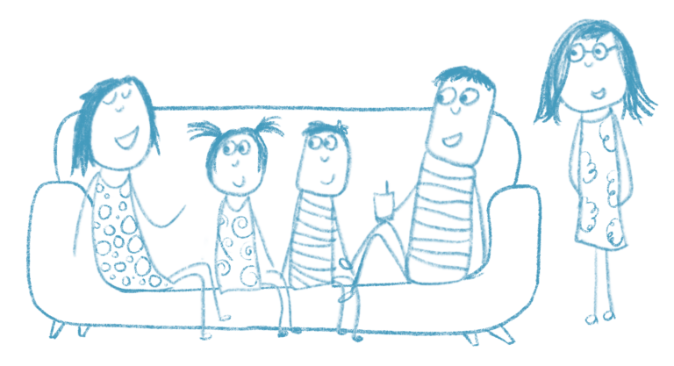¡Juntos!
Para relaciones sólidas
entre padres y hijos.


¡Hola queridos padres!
Probablemente estáis aquí porque estáis pasando por un momento desafiante con vuestros hijos, o tal vez os sentéin abrumados y estresados, y deseáis que vuestra familia pueda estar más unida y feliz. ¿Estáis buscando consejos y apoyo?
En este caso, os ayudará saber que…
Habéis encontrado el lugar adecuado. Estoy aquí para ayudaros. Mi nombre es Katja. Soy madre, orientadora de padres y ofrezco orientación, apoyo y técnicas de crianza efectivas. No estáis solos, entiendo cómo os sentís, y nunca es demasiado tarde para hacer un cambio.
¿Estos temas os resultan familiares?
- Rabietas, luchas de poder y comportamiento incontrolable en niños pequeños
- Rivalidad entre hermanos y peleas diarias
- Caos y lágrimas durante las comidas, el baño o a la hora de dormir
- Comportamiento irrespetuoso por parte de los hijos adolescentes y falta de comunicación
- Uso excesivo de pantallas o conductas adictivas
- Niños que no participan en las tareas domésticas
- Falta de motivación para la escuela o la desmotivación en general
¿O deseáis obtener más información sobre algún tema específico de crianza?
- Cómo enseñar a los niños un uso responsable de las nuevas tecnologías
- Cómo mejorar la relación y la comunicación con hijos adolescentes
- Cómo integrar la disciplina positiva y consciente en la vida cotidiana de crianza
- Cómo establecer límites saludables y aplicarlos de manera constante
- Cómo enseñar a niños entender un manejar emociones fuertes
- Cómo fomentar la participación voluntaria de los niños en las tareas domesticas
- Cómo fomentar la motivación para la escuela y la motivación en general en los niños
- Cómo practicar el autocuidado, simplificar la vida familiar y gestionar el tiempo

Soy Katja y esta es mi gama de servicios:
Hay dos enfoques disponibles para garantizar que recibís el apoyo adecuado:
Asesoramiento sistémico
Si ya existe un problema (de conducta), os recomiendo una sesión de asesoramiento sistémico.
Durante la sesión de asesoramiento con al menos uno de los padres (preferiblemente con ambos), se lleva a cabo un análisis exhaustivo de la situación actual.
Utilizando preguntas sistémicas, se logra un cambio de punto de vista sobre el problema actual que a la vez nos lleva nuevas perspectivas.
Una vez logrado el cambio de perspectiva junto con los recursos disponibles en cada familia, se nos abre una gama amplia de posibles soluciones.
Coaching
Para aquellos de vosotros que queráis aprender más sobre un tema específico de crianza, os recomiendo un curso de coaching.
La duración del curso de coaching varía según la complejidad del tema. Suele necesitar entre dos y cuatro sesiones, de una hora de duración cada una.
El apartado “Coaching” proporciona una descripción general de todos los cursos que ofrezco en la actualidad. Si no encontráis el tema que buscáis, por favor no dudéis en poneros en contacto conmigo.
Según vuestras preguntas y necesidades individuales, prepararé encantada un coaching personalizado acorde a vuestro tema.

Katja
¿Tienes preguntas o dudas?
Para cualquier pregunta/duda no dudéis en poneros en contacto conmigo para una consulta inicial gratuita o enviadme un correo electrónico a través del formulario que se encontráis a continuación.


